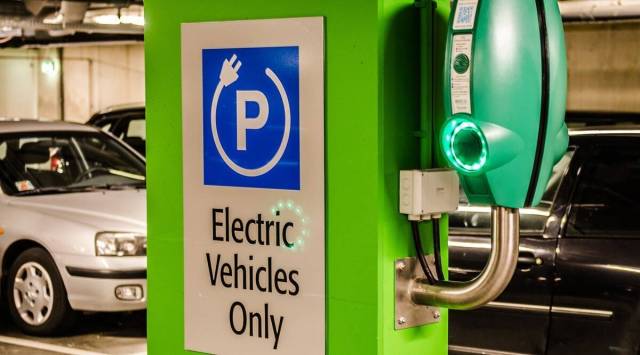Chandigarh’s big EV push: Fossil fuel-based four-wheeler registrations to stop by Dec
The Chandigarh Administration has notified the Electric Vehicle Policy 2022 to achieve the objective of eco-friendly transportation.
 The decision to ban fuel-based vehicle registrations in Chandigarh is part of a larger effort to address the city's growing vehicle density and promote sustainable transportation options. (File)
The decision to ban fuel-based vehicle registrations in Chandigarh is part of a larger effort to address the city's growing vehicle density and promote sustainable transportation options. (File) The Chandigarh administration announced that it will cease the registrations of fuel based two wheelers by July and four wheelers by December with the end of respective fiscal year targets.The official announcement came on Friday stating the aim is to discourage the use of non-electric vehicles under the Electric Vehicle Policy 2022. The registration will begin with new targets from the next fiscal year.
The Chandigarh Administration department of science and technology and renewable energy had issued the electric vehicle policy in September 2022.
Chandigarh is the city with the highest vehicle density and is the only one to announce such a ban.
“In order to achieve the aim of eco-friendly and green transportation in the city the Chandigarh Administration notified the Electric Vehicle Policy 2022. The aim of the ban was ten percent reduction in four wheelers and 35 percent in two wheelers in the first year i.e 2022 as compared to the preceding year. The targets for the current financial year 2023-24 are 20 percent reduction in four wheelers and 70 percent in two wheelers,” UT said.
The number of two wheelers that can be registered this year has been fixed at 6202 for two wheelers 22,626 for four wheelers. 4032 two wheelers and 2685 four wheelers have already been registered from April till today.
The administration aims to entirely stop the registration of two wheelers by 2024 and a gradual decrease of four wheelers.
Pradyuman Singh, Director Transport Chandigarh who handles the charge of Registering and Licensing Authority said, “The registration of non-electric 2 wheelers shall not be done by this office after achieving the target of 6202 non-electric two wheelers. Similarly, registration of 4 wheelers shall not be done after registration of 22,626 non-electric four wheelers for the current financial year that is 2023-24.It is further informed that after achieving the registration targets of non-electric two wheelers, the registration (i.e. permanent and temporary both) will not be allowed within Chandigarh as the registration quota for the subsequent year in the policy is NIL for non-electric two wheelers.”
He added that the target of non-electric two wheelers is likely to be achieved by the first week of July and that of four wheelers is likely to be achieved by December end.
“This is to inform people that the registrations of two wheelers would stop by July first week while that of four wheelers will stop by December end,” he said.
After UT’s decision, the Federation of Chandigarh Region Automobile Dealers Association stated that UT is forcing people to buy Electric vehicles and it will impact 10,000 people economically.
“Over 2500 people have been employed. Where will they go after July? The rough estimate of inventory is Rs 100 crore with average funds required to set up for a dealer is Rs 5 crore. They are compelled to close our dealerships and most of the two wheeler dealers will be bankrupt. Almost 10000 people will be affected economically. In the current scenario of joblessness, the government is taking away our jobs,” the federation said.
It was added, “This will not lead to any good as we cannot stop petrol vehicles from outside states from entering the city. This is going to force people to buy expensive and unreliable EV vehicles.”
According to the policy, in the first year, the minimum achievable target is 35% for e-two-wheelers and e-three-wheelers, 20% for goods’ e-three-wheelers and e-four-wheelers. For personal e-cars the target this year is set at 10%, while for e-buses it is 40% and for e-cars commercial it is 20%.
In 2023, the second year, minimum achievable target of e-two-wheelers and e-three-wheelers, that is, passenger autos, the target is 70% each, while that of goods e-three-wheelers and e-four-wheelers is 40% each. For e-cars for personal use the target increases to 20%, while for e-buses it increases to 50% in the second year.
Similarly, in year three, four and five, the target for e-two-wheelers and e-three-wheelers, that is, passenger autos, it is 100% which means from 2024 onwards, the registrations of fuel-based two-wheelers and autos will be completely stopped, while for personal e-cars it is 30%, 40% and 50% for 2024, 2025 and 2026 respectively. For e-buses too, the target set is 100% by fifth year which means the registrations of all fuel-based buses will be entirely stopped.








